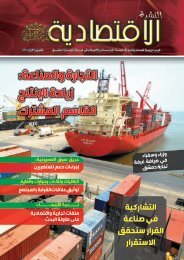SIGAR
2017-01-30qr
2017-01-30qr
Create successful ePaper yourself
Turn your PDF publications into a flip-book with our unique Google optimized e-Paper software.
RECONSTRUCTION UPDATE<br />
RECONSTRUCTION UPDATE<br />
OVERVIEW<br />
According to the United Nations Secretary-General, there was no substantive<br />
movement towards peace between the Afghan government and the<br />
Taliban this quarter. Taliban leaders reportedly believe that the 2016 fighting<br />
season was a success and, for the time being, see no incentive to enter into<br />
a strategic negotiation process. On December 23, 2016, the Taliban again<br />
publicly rejected peace talks, reiterating their long-held stance that talk of<br />
peace and reconciliation is “meaningless” as long as foreign forces remain<br />
in Afghanistan.<br />
The same day, President Barack Obama signed the Fiscal Year (FY)<br />
2017 National Defense Authorization Act, authorizing up to $4.26 billion<br />
for the Afghanistan Security Forces Fund (ASFF.) The ASFF is the United<br />
States’ principal fund to build, train, equip, and sustain the Afghan National<br />
Defense and Security Forces (ANDSF). President Obama pledged to recommend<br />
to his successor that the United States continue to seek funding for<br />
the ANDSF at or near current levels through 2020. For its part, the international<br />
community pledged at the October 2016 NATO summit in Warsaw to<br />
provide more than $800 million annually for the ANDSF from 2018 to 2020.<br />
<strong>SIGAR</strong>’s analysis of the most recent data provided by U.S. Forces in<br />
Afghanistan (USFOR-A) suggests that the security situation in Afghanistan<br />
has not improved this quarter. The numbers of the Afghan security forces<br />
are decreasing, while both casualties and the number of districts under<br />
insurgent control or influence are increasing.<br />
The Afghan government faced tensions within the executive branch<br />
over the actions of First Vice-President Abdul Rashid Dostum and conflict<br />
between the executive and parliament over the dismissal of seven government<br />
ministers.<br />
In October, First Vice-President Dostum publicly accused President<br />
Ashraf Ghani and Chief Executive Abdullah Abdullah of nepotism and ethnic<br />
bias in government appointments. Both Ghani and Abdullah’s offices<br />
condemned Dostum’s statement.<br />
Then on November 24, Dostum reportedly kidnapped a political rival, a<br />
former governor of Jowzjan Province. Once released, the victim accused<br />
Dostum on national television of ordering him to be beaten and raped with<br />
REPORT TO THE UNITED STATES CONGRESS I JANUARY 30, 2017<br />
65







